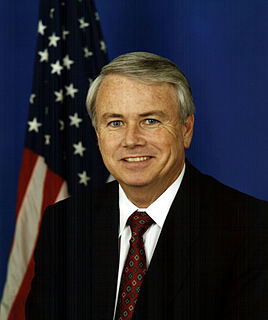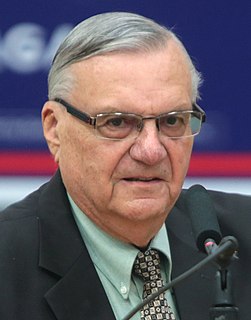A Quote by Steve King
I don't think you get that ask unless you first enforce the law, and demonstrate you secured the border. And still whatever this does to our hearts, and it tugs on mine, too, but the most important thing is to restore the respect for the rule of law.
Related Quotes
In a democracy - even if it is a so-called democracy like our white-?litist one - the greatest veneration one can show the rule of law is to keep a watch on it, and to reserve the right to judge unjust laws and the subversion of the function of the law by the power of the state. That vigilance is the most important proof of respect for the law.
I think that Obama's failure to reestablish the rule of law in money matters is the most damaging thing that he's done - and perhaps the most damaging thing that has happened in American politics in my lifetime. Because once the rule of law is absent in money matters, then anything really goes in politics.
I studied law before I became a filmmaker, and I actually have a great belief in the justice system and the rule of law. I think it's the thing that separates us from animals. I really believe in the rule of law because it's an attempt to bring rational accountability to human behavior, which has a great capability of becoming irrational.
There is one all-important law of human conduct. If we obey that law, we shall almost never get into trouble. In fact, that law, if obeyed, will bring us countless friends and constant happiness. But the very instant we break the law, we shall get into endless trouble. The law is this: Always make the other person feel important.
Immigration law doesn`t exist for the purpose of keeping criminals out. It exists to protect all aspects of American life, the work site, the welfare office, the education system, and everything else. That is why immigration limits are established in the first place. If we only enforce the laws against crime, then we have an open border to the entire world. We will enforce all of our immigration laws!
We needed to be uncompromising with our workforce, to expect 100 percent of our employees to comply 100 percent of the time with complex and ever-changing government mandates. Striving to comply with every law does not mean agreeing with every law. But, even when faced with laws we think are counter-productive, we must first comply. Only then, from a credible position, can we enter into a dialogue with regulatory agencies to demonstrate alternatives that are more beneficial. If these efforts fail, we can then join with others in using education and/or political efforts to change the law.
Deanell Tacha and I decided to write an editorial, because both of us have had experiences in countries where the rule of law is not strong. Uh, where there is civil war. Where there is disorder. And, it, it seemed to us important to underscore that this is a treasure, our rule of law, our judiciary independent from politics, and it's in jeopardy.


































